Financial Management: Functions, Importance, Manager Role & Capital
VerifiedAdded on 2023/06/11
|8
|1485
|130
Report
AI Summary
This report provides a comprehensive overview of financial management, defining it as the process of planning, controlling, and directing financial activities to ensure the procurement and proper utilization of funds. It explores the core functions of financial management within a business enterprise, including capital requirement evaluation, fund source selection, cash management, and dividend rate identification. The report highlights the importance of financial management in making financial plans, enabling investment opportunities, facilitating sound financial decisions, maintaining economic stability, and ensuring proper tax planning. Furthermore, it elucidates the role of a finance manager in delivering and analyzing financial details, monitoring cash flows, formulating strategies, identifying market trends, and leading staff members. Finally, the report outlines both short-term (trade credit, commercial bank loans, commercial paper) and long-term (equity capital, debentures, preference capital, retained earnings) sources of capital available to companies for running their businesses.

FINANCIAL
MANAGEMENT
MANAGEMENT
Paraphrase This Document
Need a fresh take? Get an instant paraphrase of this document with our AI Paraphraser
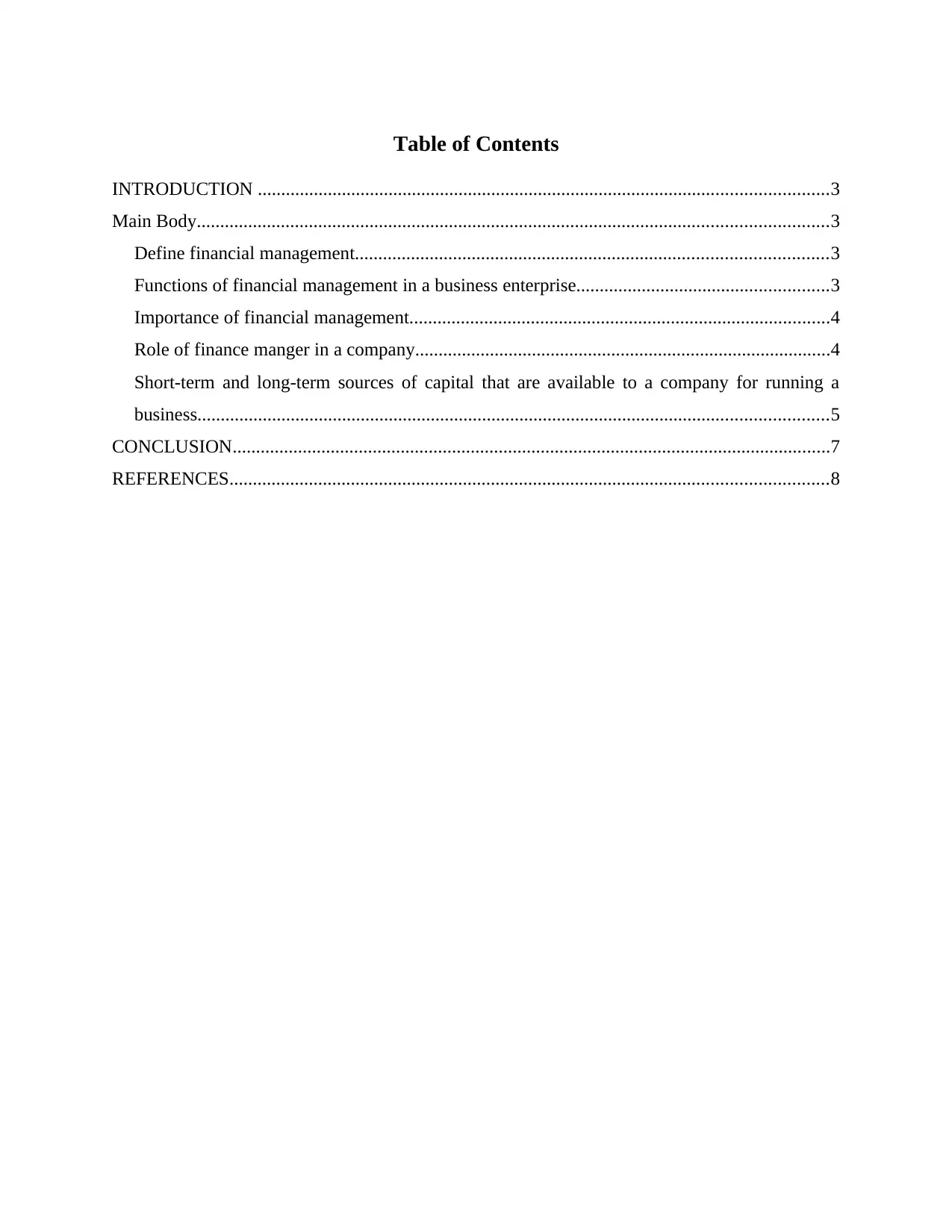
Table of Contents
INTRODUCTION ..........................................................................................................................3
Main Body.......................................................................................................................................3
Define financial management.....................................................................................................3
Functions of financial management in a business enterprise......................................................3
Importance of financial management..........................................................................................4
Role of finance manger in a company.........................................................................................4
Short-term and long-term sources of capital that are available to a company for running a
business.......................................................................................................................................5
CONCLUSION................................................................................................................................7
REFERENCES................................................................................................................................8
INTRODUCTION ..........................................................................................................................3
Main Body.......................................................................................................................................3
Define financial management.....................................................................................................3
Functions of financial management in a business enterprise......................................................3
Importance of financial management..........................................................................................4
Role of finance manger in a company.........................................................................................4
Short-term and long-term sources of capital that are available to a company for running a
business.......................................................................................................................................5
CONCLUSION................................................................................................................................7
REFERENCES................................................................................................................................8
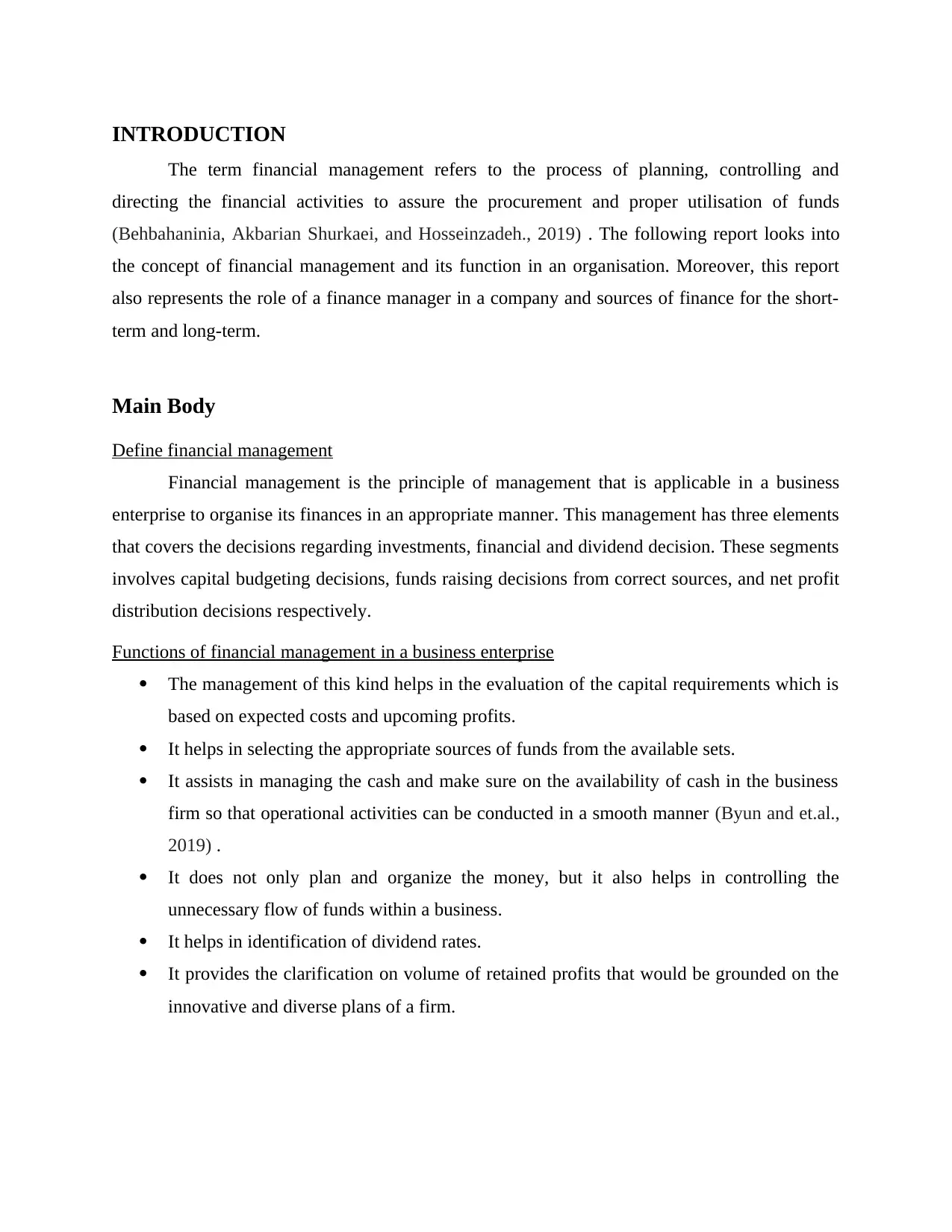
INTRODUCTION
The term financial management refers to the process of planning, controlling and
directing the financial activities to assure the procurement and proper utilisation of funds
(Behbahaninia, Akbarian Shurkaei, and Hosseinzadeh., 2019) . The following report looks into
the concept of financial management and its function in an organisation. Moreover, this report
also represents the role of a finance manager in a company and sources of finance for the short-
term and long-term.
Main Body
Define financial management
Financial management is the principle of management that is applicable in a business
enterprise to organise its finances in an appropriate manner. This management has three elements
that covers the decisions regarding investments, financial and dividend decision. These segments
involves capital budgeting decisions, funds raising decisions from correct sources, and net profit
distribution decisions respectively.
Functions of financial management in a business enterprise
The management of this kind helps in the evaluation of the capital requirements which is
based on expected costs and upcoming profits.
It helps in selecting the appropriate sources of funds from the available sets.
It assists in managing the cash and make sure on the availability of cash in the business
firm so that operational activities can be conducted in a smooth manner (Byun and et.al.,
2019) .
It does not only plan and organize the money, but it also helps in controlling the
unnecessary flow of funds within a business.
It helps in identification of dividend rates.
It provides the clarification on volume of retained profits that would be grounded on the
innovative and diverse plans of a firm.
The term financial management refers to the process of planning, controlling and
directing the financial activities to assure the procurement and proper utilisation of funds
(Behbahaninia, Akbarian Shurkaei, and Hosseinzadeh., 2019) . The following report looks into
the concept of financial management and its function in an organisation. Moreover, this report
also represents the role of a finance manager in a company and sources of finance for the short-
term and long-term.
Main Body
Define financial management
Financial management is the principle of management that is applicable in a business
enterprise to organise its finances in an appropriate manner. This management has three elements
that covers the decisions regarding investments, financial and dividend decision. These segments
involves capital budgeting decisions, funds raising decisions from correct sources, and net profit
distribution decisions respectively.
Functions of financial management in a business enterprise
The management of this kind helps in the evaluation of the capital requirements which is
based on expected costs and upcoming profits.
It helps in selecting the appropriate sources of funds from the available sets.
It assists in managing the cash and make sure on the availability of cash in the business
firm so that operational activities can be conducted in a smooth manner (Byun and et.al.,
2019) .
It does not only plan and organize the money, but it also helps in controlling the
unnecessary flow of funds within a business.
It helps in identification of dividend rates.
It provides the clarification on volume of retained profits that would be grounded on the
innovative and diverse plans of a firm.
⊘ This is a preview!⊘
Do you want full access?
Subscribe today to unlock all pages.

Trusted by 1+ million students worldwide
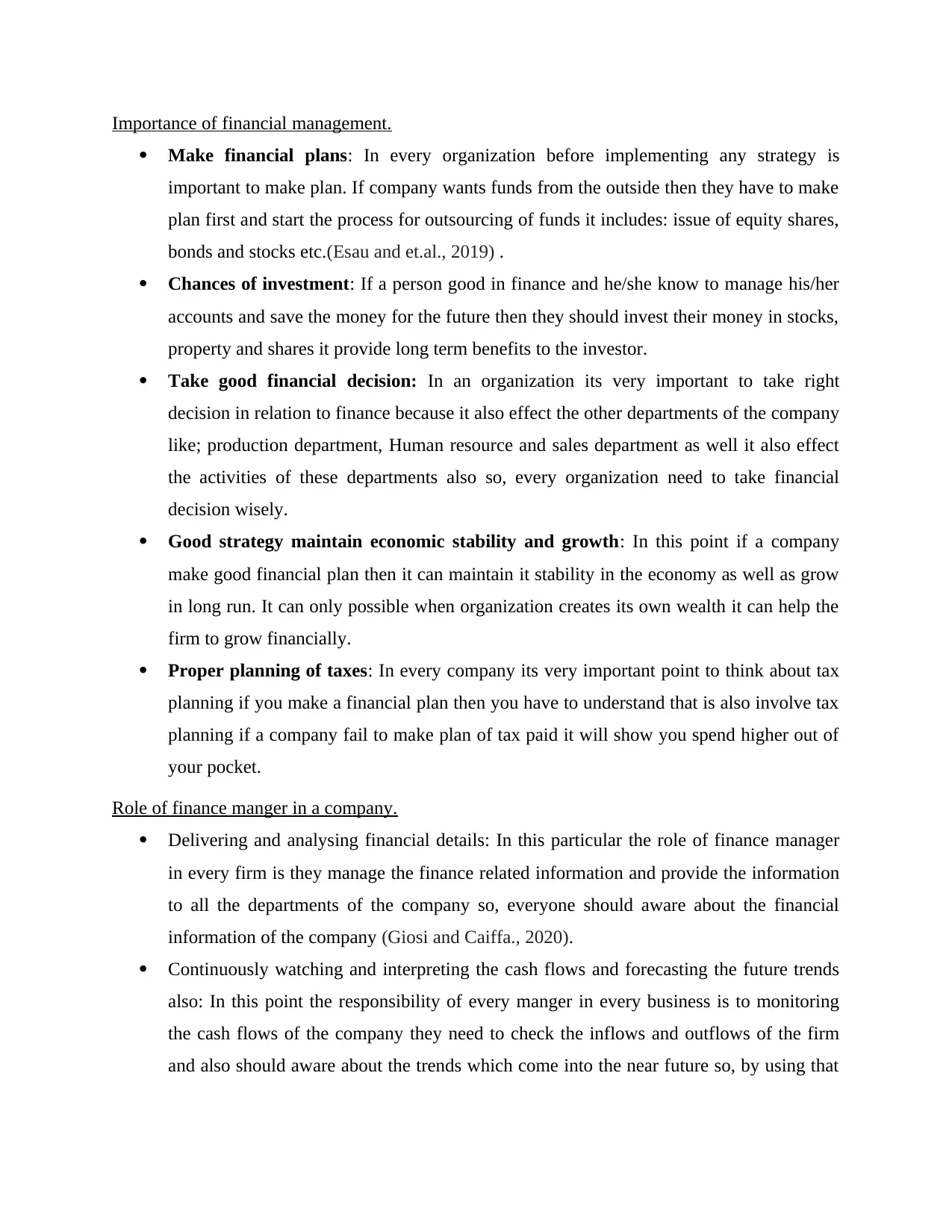
Importance of financial management.
Make financial plans: In every organization before implementing any strategy is
important to make plan. If company wants funds from the outside then they have to make
plan first and start the process for outsourcing of funds it includes: issue of equity shares,
bonds and stocks etc.(Esau and et.al., 2019) .
Chances of investment: If a person good in finance and he/she know to manage his/her
accounts and save the money for the future then they should invest their money in stocks,
property and shares it provide long term benefits to the investor.
Take good financial decision: In an organization its very important to take right
decision in relation to finance because it also effect the other departments of the company
like; production department, Human resource and sales department as well it also effect
the activities of these departments also so, every organization need to take financial
decision wisely.
Good strategy maintain economic stability and growth: In this point if a company
make good financial plan then it can maintain it stability in the economy as well as grow
in long run. It can only possible when organization creates its own wealth it can help the
firm to grow financially.
Proper planning of taxes: In every company its very important point to think about tax
planning if you make a financial plan then you have to understand that is also involve tax
planning if a company fail to make plan of tax paid it will show you spend higher out of
your pocket.
Role of finance manger in a company.
Delivering and analysing financial details: In this particular the role of finance manager
in every firm is they manage the finance related information and provide the information
to all the departments of the company so, everyone should aware about the financial
information of the company (Giosi and Caiffa., 2020).
Continuously watching and interpreting the cash flows and forecasting the future trends
also: In this point the responsibility of every manger in every business is to monitoring
the cash flows of the company they need to check the inflows and outflows of the firm
and also should aware about the trends which come into the near future so, by using that
Make financial plans: In every organization before implementing any strategy is
important to make plan. If company wants funds from the outside then they have to make
plan first and start the process for outsourcing of funds it includes: issue of equity shares,
bonds and stocks etc.(Esau and et.al., 2019) .
Chances of investment: If a person good in finance and he/she know to manage his/her
accounts and save the money for the future then they should invest their money in stocks,
property and shares it provide long term benefits to the investor.
Take good financial decision: In an organization its very important to take right
decision in relation to finance because it also effect the other departments of the company
like; production department, Human resource and sales department as well it also effect
the activities of these departments also so, every organization need to take financial
decision wisely.
Good strategy maintain economic stability and growth: In this point if a company
make good financial plan then it can maintain it stability in the economy as well as grow
in long run. It can only possible when organization creates its own wealth it can help the
firm to grow financially.
Proper planning of taxes: In every company its very important point to think about tax
planning if you make a financial plan then you have to understand that is also involve tax
planning if a company fail to make plan of tax paid it will show you spend higher out of
your pocket.
Role of finance manger in a company.
Delivering and analysing financial details: In this particular the role of finance manager
in every firm is they manage the finance related information and provide the information
to all the departments of the company so, everyone should aware about the financial
information of the company (Giosi and Caiffa., 2020).
Continuously watching and interpreting the cash flows and forecasting the future trends
also: In this point the responsibility of every manger in every business is to monitoring
the cash flows of the company they need to check the inflows and outflows of the firm
and also should aware about the trends which come into the near future so, by using that
Paraphrase This Document
Need a fresh take? Get an instant paraphrase of this document with our AI Paraphraser
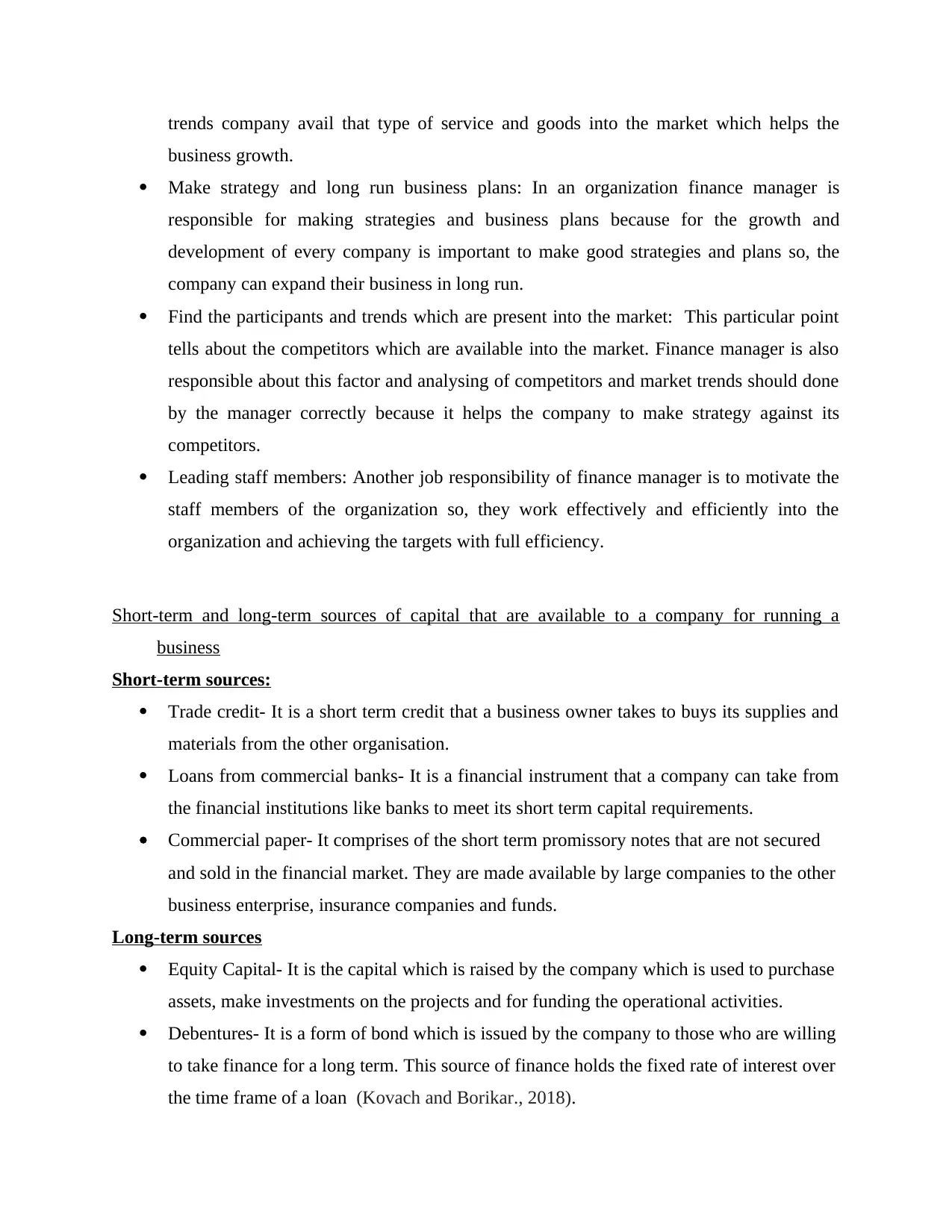
trends company avail that type of service and goods into the market which helps the
business growth.
Make strategy and long run business plans: In an organization finance manager is
responsible for making strategies and business plans because for the growth and
development of every company is important to make good strategies and plans so, the
company can expand their business in long run.
Find the participants and trends which are present into the market: This particular point
tells about the competitors which are available into the market. Finance manager is also
responsible about this factor and analysing of competitors and market trends should done
by the manager correctly because it helps the company to make strategy against its
competitors.
Leading staff members: Another job responsibility of finance manager is to motivate the
staff members of the organization so, they work effectively and efficiently into the
organization and achieving the targets with full efficiency.
Short-term and long-term sources of capital that are available to a company for running a
business
Short-term sources:
Trade credit- It is a short term credit that a business owner takes to buys its supplies and
materials from the other organisation.
Loans from commercial banks- It is a financial instrument that a company can take from
the financial institutions like banks to meet its short term capital requirements.
Commercial paper- It comprises of the short term promissory notes that are not secured
and sold in the financial market. They are made available by large companies to the other
business enterprise, insurance companies and funds.
Long-term sources
Equity Capital- It is the capital which is raised by the company which is used to purchase
assets, make investments on the projects and for funding the operational activities.
Debentures- It is a form of bond which is issued by the company to those who are willing
to take finance for a long term. This source of finance holds the fixed rate of interest over
the time frame of a loan (Kovach and Borikar., 2018).
business growth.
Make strategy and long run business plans: In an organization finance manager is
responsible for making strategies and business plans because for the growth and
development of every company is important to make good strategies and plans so, the
company can expand their business in long run.
Find the participants and trends which are present into the market: This particular point
tells about the competitors which are available into the market. Finance manager is also
responsible about this factor and analysing of competitors and market trends should done
by the manager correctly because it helps the company to make strategy against its
competitors.
Leading staff members: Another job responsibility of finance manager is to motivate the
staff members of the organization so, they work effectively and efficiently into the
organization and achieving the targets with full efficiency.
Short-term and long-term sources of capital that are available to a company for running a
business
Short-term sources:
Trade credit- It is a short term credit that a business owner takes to buys its supplies and
materials from the other organisation.
Loans from commercial banks- It is a financial instrument that a company can take from
the financial institutions like banks to meet its short term capital requirements.
Commercial paper- It comprises of the short term promissory notes that are not secured
and sold in the financial market. They are made available by large companies to the other
business enterprise, insurance companies and funds.
Long-term sources
Equity Capital- It is the capital which is raised by the company which is used to purchase
assets, make investments on the projects and for funding the operational activities.
Debentures- It is a form of bond which is issued by the company to those who are willing
to take finance for a long term. This source of finance holds the fixed rate of interest over
the time frame of a loan (Kovach and Borikar., 2018).
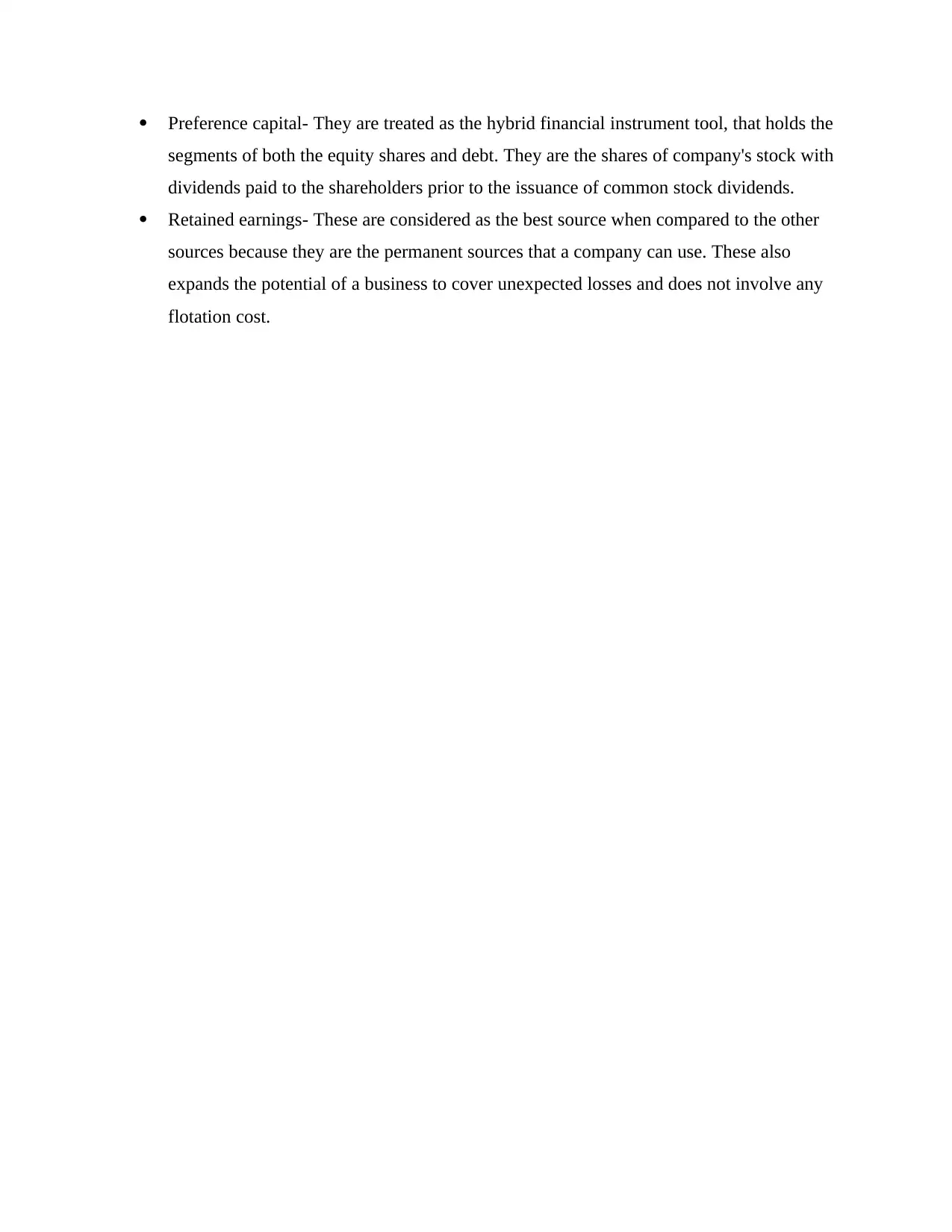
Preference capital- They are treated as the hybrid financial instrument tool, that holds the
segments of both the equity shares and debt. They are the shares of company's stock with
dividends paid to the shareholders prior to the issuance of common stock dividends.
Retained earnings- These are considered as the best source when compared to the other
sources because they are the permanent sources that a company can use. These also
expands the potential of a business to cover unexpected losses and does not involve any
flotation cost.
segments of both the equity shares and debt. They are the shares of company's stock with
dividends paid to the shareholders prior to the issuance of common stock dividends.
Retained earnings- These are considered as the best source when compared to the other
sources because they are the permanent sources that a company can use. These also
expands the potential of a business to cover unexpected losses and does not involve any
flotation cost.
⊘ This is a preview!⊘
Do you want full access?
Subscribe today to unlock all pages.

Trusted by 1+ million students worldwide
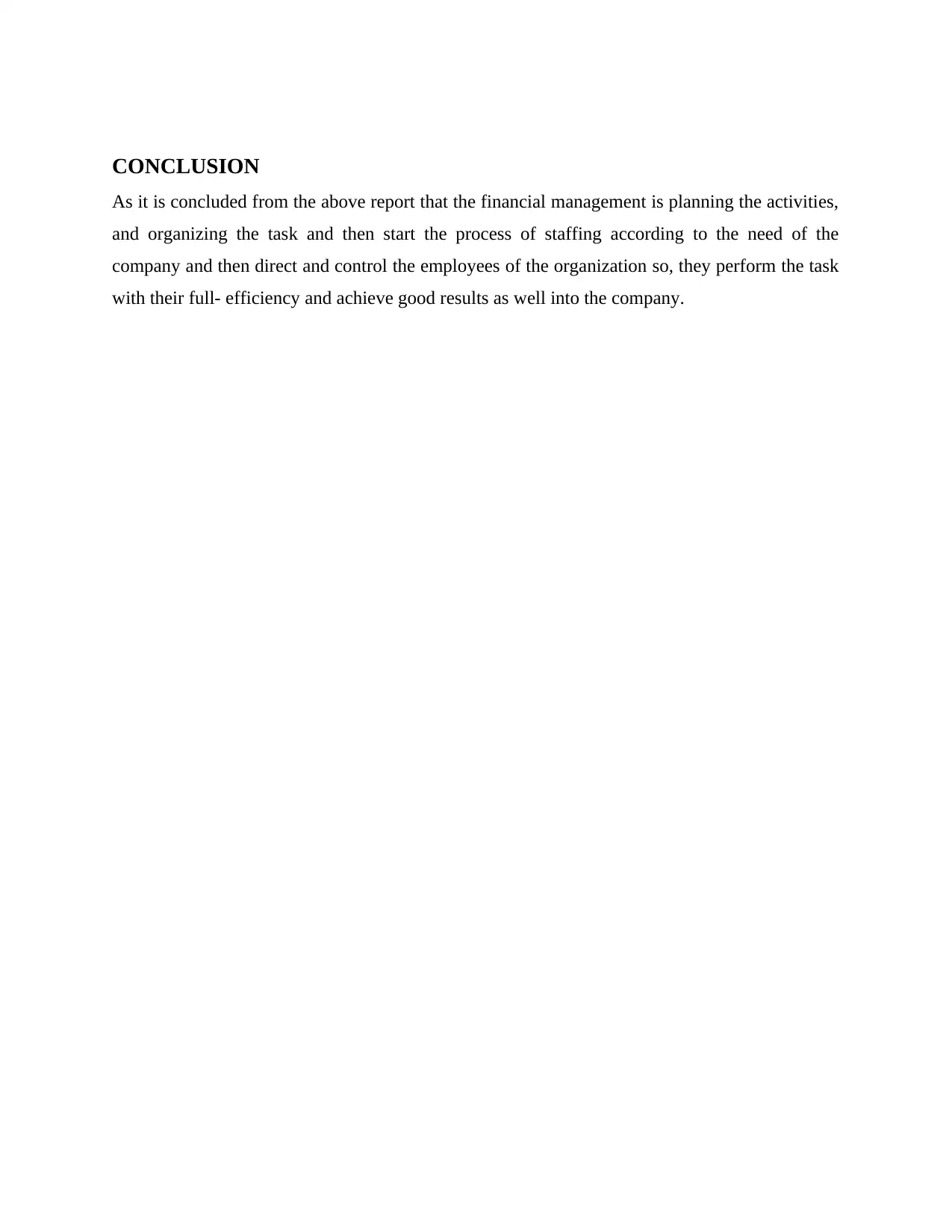
CONCLUSION
As it is concluded from the above report that the financial management is planning the activities,
and organizing the task and then start the process of staffing according to the need of the
company and then direct and control the employees of the organization so, they perform the task
with their full- efficiency and achieve good results as well into the company.
As it is concluded from the above report that the financial management is planning the activities,
and organizing the task and then start the process of staffing according to the need of the
company and then direct and control the employees of the organization so, they perform the task
with their full- efficiency and achieve good results as well into the company.
Paraphrase This Document
Need a fresh take? Get an instant paraphrase of this document with our AI Paraphraser
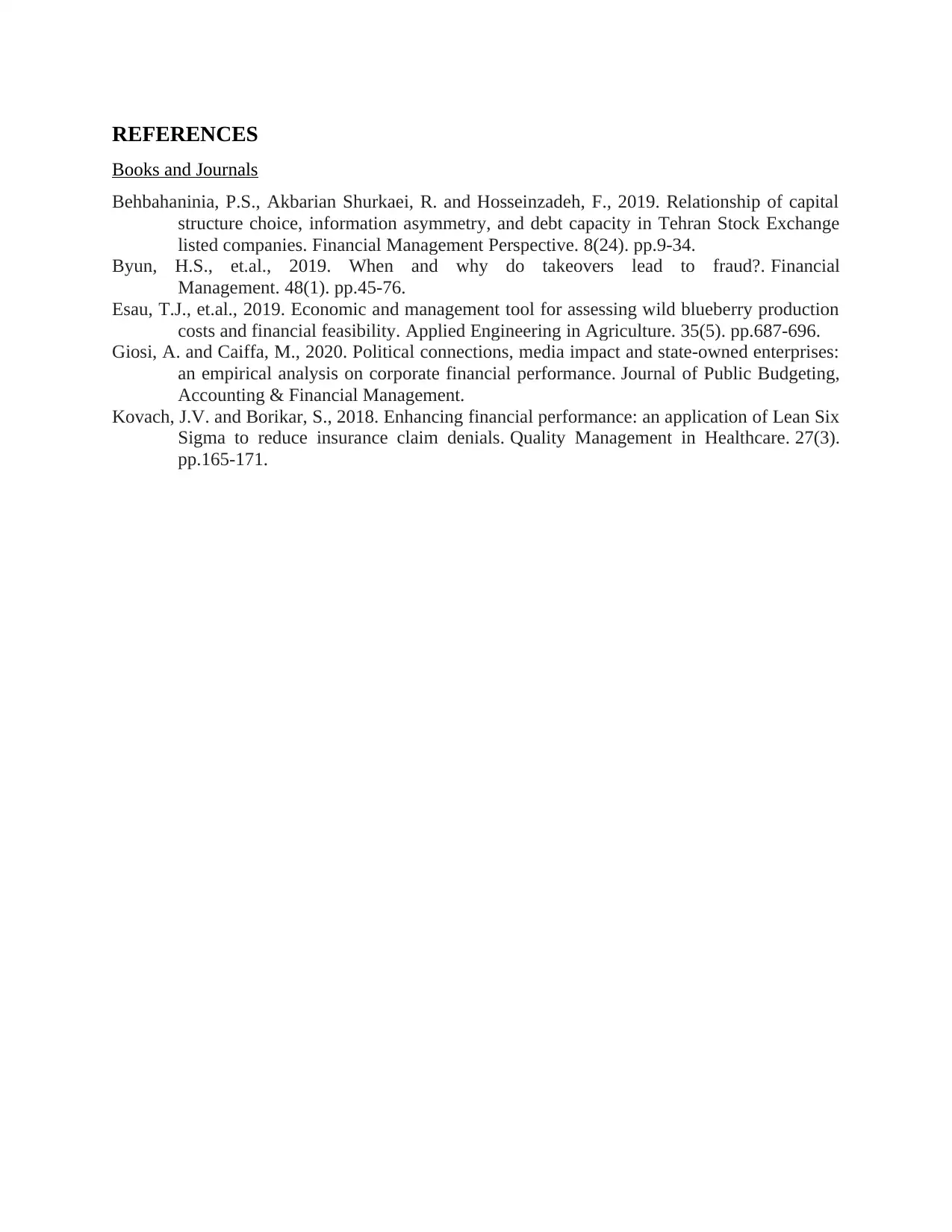
REFERENCES
Books and Journals
Behbahaninia, P.S., Akbarian Shurkaei, R. and Hosseinzadeh, F., 2019. Relationship of capital
structure choice, information asymmetry, and debt capacity in Tehran Stock Exchange
listed companies. Financial Management Perspective. 8(24). pp.9-34.
Byun, H.S., et.al., 2019. When and why do takeovers lead to fraud?. Financial
Management. 48(1). pp.45-76.
Esau, T.J., et.al., 2019. Economic and management tool for assessing wild blueberry production
costs and financial feasibility. Applied Engineering in Agriculture. 35(5). pp.687-696.
Giosi, A. and Caiffa, M., 2020. Political connections, media impact and state-owned enterprises:
an empirical analysis on corporate financial performance. Journal of Public Budgeting,
Accounting & Financial Management.
Kovach, J.V. and Borikar, S., 2018. Enhancing financial performance: an application of Lean Six
Sigma to reduce insurance claim denials. Quality Management in Healthcare. 27(3).
pp.165-171.
Books and Journals
Behbahaninia, P.S., Akbarian Shurkaei, R. and Hosseinzadeh, F., 2019. Relationship of capital
structure choice, information asymmetry, and debt capacity in Tehran Stock Exchange
listed companies. Financial Management Perspective. 8(24). pp.9-34.
Byun, H.S., et.al., 2019. When and why do takeovers lead to fraud?. Financial
Management. 48(1). pp.45-76.
Esau, T.J., et.al., 2019. Economic and management tool for assessing wild blueberry production
costs and financial feasibility. Applied Engineering in Agriculture. 35(5). pp.687-696.
Giosi, A. and Caiffa, M., 2020. Political connections, media impact and state-owned enterprises:
an empirical analysis on corporate financial performance. Journal of Public Budgeting,
Accounting & Financial Management.
Kovach, J.V. and Borikar, S., 2018. Enhancing financial performance: an application of Lean Six
Sigma to reduce insurance claim denials. Quality Management in Healthcare. 27(3).
pp.165-171.
1 out of 8
Related Documents
Your All-in-One AI-Powered Toolkit for Academic Success.
+13062052269
info@desklib.com
Available 24*7 on WhatsApp / Email
![[object Object]](/_next/static/media/star-bottom.7253800d.svg)
Unlock your academic potential
Copyright © 2020–2026 A2Z Services. All Rights Reserved. Developed and managed by ZUCOL.





